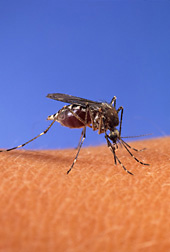from the Greater Los Angeles County Vector Control District
 Vector ecologists from from the Greater Los Angeles County Vector Control District (GLACVCD) report that six additional mosquito samples and two more dead birds collected in the District this summer have tested positive for West Nile virus (WNV).
Vector ecologists from from the Greater Los Angeles County Vector Control District (GLACVCD) report that six additional mosquito samples and two more dead birds collected in the District this summer have tested positive for West Nile virus (WNV).
Please refer to the charts below for a breakdown of the West Nile virus activity confirmed this past week.
|
City or Community |
Zip Code(s) |
# of WNV+ mosquito samples collected |
|
Burbank |
91505 |
1 |
|
San Marino |
91108 |
1 |
|
Encino |
91436, 91306 |
3 |
|
Chatsworth |
91311 |
1 |
|
City or Community |
Zip Code(s) |
WNV+ dead bird |
|
Sherman Oaks |
91411 |
1 American Crow |
|
Northridge |
91324 |
1 Raven |
This is the first sign of virus activity in Burbank, San Marino, Chatsworth, Sherman Oaks, and Northridge. So far this year, GLACVCD has identified a total of 20 WNV positive mosquito samples and four WNV positive dead birds within its jurisdiction.
Statewide, a total of 593 mosquito samples and 432 dead birds have been identified as positive for West Nile virus. In addition, six human cases of West Nile virus have been reported throughout California.
The District would like to remind residents to be vigilant against the threat of West Nile virus in their neighborhoods. Follow these simple steps to prevent mosquito breeding and guard against mosquito-transmitted illnesses:
- Eliminate standing water in clogged rain gutters, rain barrels, discarded tires, buckets, watering troughs or anything that holds water for more than a week.
- Change the water in pet dishes and birdbaths weekly.
- Ensure that swimming pools, spas, and ponds are properly maintained and report neglected pools in your neighborhood.
- Request FREE mosquitofish from your local vector control district for placement in out-of-order swimming pools, spas, and ponds.
- Wear insect repellent containing active ingredients such as DEET, Picaridin, or IR3535 when outdoors where mosquitoes are present.
West Nile virus is transmitted to people and animals through the bite of an infected mosquito. There is no cure for West Nile virus. One in five persons infected with West Nile virus will exhibit symptoms. Symptoms usually occur between 5 and 15 days and can include fever, headache, body aches, nausea, or a skin rash. These symptoms can last for several weeks to months. One in 150 people infected with the virus will require hospitalization. Severe symptoms include high fever, muscle weakness, neck stiffness, coma, paralysis, and possibly death.
The public is encouraged to report dead birds to help with West Nile virus surveillance and control efforts because birds play an important role in maintaining and spreading the virus. To reach the California Department of Public Health (CDPH), call their toll-free hotline at
1-877-WNV BIRD or visit them on-line at www.westnile.ca.gov.
For more information, please contact the Greater Los Angeles County Vector Control District at(562)944-9656 or visit www.glacvcd.org. For media inquiries, please contact Director of Community Affairs Truc Dever at (562) 244-2648.



